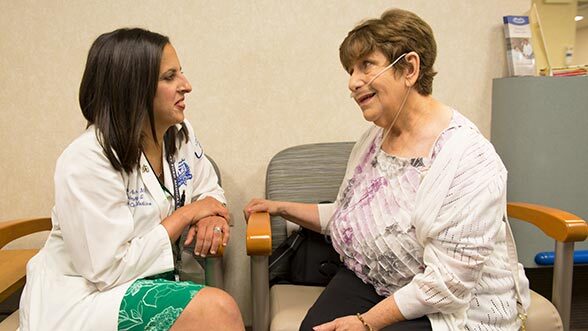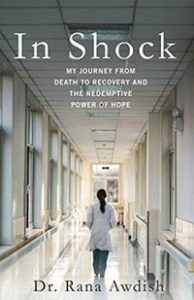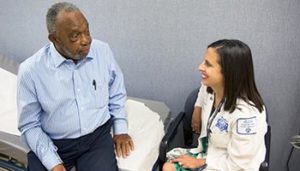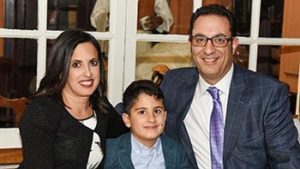Doctor, heal thyself
The last day of Rana Awdish’s fellowship at Detroit’s Henry Ford Hospital was supposed to be one of celebration: She had completed the training to become a pulmonologist and was ready for what lay ahead.
But at dinner with a friend, Awdish, BS ’96, then seven months pregnant, began experiencing abdominal pain so intense she couldn’t physically eat. She was rushed to the Henry Ford Hospital — to her hospital. Within minutes of being admitted, and only hours after walking those same halls as a physician, Awdish would be struggling to stay alive. An occult adenoma — a benign tumor in her liver — had ruptured, flooding her internal organs with blood and causing multi-system organ failure. Awdish lost the pregnancy. After an emergency C-section, doctors placed her on life support, and she suffered a stroke.
It was clear Awdish was facing insurmountable odds, and those taking care of her, purposefully or not, made their doubts about her recovery known. Awdish remembers hearing someone say she was “trying to die” on them. It was a phrase she had used more than once herself, but, in that moment, she heard the implicit animosity toward the patient — toward her — not the illness attacking her. Awdish recoiled from the careless terminology that inflicted even more pain as she fought for her life.
Months later, Awdish defied the odds and made a full recovery. She decided to share her story to illuminate the imbalance between expert care and thoughtless commentary, doing everything in her power to help bridge the divide. She is now a critical care physician at the Henry Ford Hospital and serves as director of the Pulmonary Hypertension Program. Awdish is also the medical director of Care Experience for the Henry Ford Health System.
Last year she became an author, publishing her memoir, In Shock: My Journey from Death to Recovery and the Redemptive Power of Hope (St. Martin’s Press, 2017). We recently spoke to her about her experience.
Michigan Today: What did you learn in medical school about how to interact with patients?
Rana Awdish: I started medical school in 1998, so we had almost no education around patient interactions or conversations in our first two years of nonclinical training. The introduction to the physical exam was the first time we interacted with patients, and we focused entirely on how to accomplish the history and physical. It was very perfunctory. There was no attention given to communicating in a way that built relationships. It wasn’t that there was a curriculum that wasn’t working. There wasn’t a curriculum at all.
MT: How did that perspective change after you became a patient?

Awdish turned her trauma into a healing experience for others. (Image courtesy of Rana Awdish and the Schwartz Center for Compassionate Healthcare.)
RA: It’s interesting. I went through a lot of different phases with my illness. I realized my physicians were having a difficult time communicating bad news with me. I could see that very clearly, and I could see that in myself — that I had struggled with the same things they were struggling with. I know they didn’t mean for their words to harm, but, as a patient, they landed on me in a way that felt hurtful. And I saw myself in every failure. I thought about our training [as doctors], and how we had gotten there, and why I was experiencing the things I was experiencing. And it was pretty easy to see we just didn’t have the training. We were taught, in many ways, to avoid connection.
MT: What are some common misconceptions about the doctor-patient relationship, speaking as someone who has seen both sides?
RA: We were explicitly taught that feeling any connection to our patient was potentially detrimental. Maybe we wouldn’t be able to deal with the depth and extent of our own emotions. Perhaps it would cloud our ability to provide good patient care. Without a clinical distance and an element of detachment, we would, by virtue of our feelings, be skewed into making decisions that were not sound. And as a student/trainee/doctor, hearing that your feelings could be a threat to your patients is terrifying, because that’s who you’re there to help.
And so, because I think the medical system is a process of acculturation — where you’re just trying to match the people that you are apprenticing — we fell for it. It wasn’t until my own illness, and when I went back to medicine, that I started to see it really for the lie that it was — that we could be more available to our patients. The only physicians that I felt I had a healing relationship with as a patient were the ones who allowed themselves to develop a relationship with me, and didn’t shy away from it.
MT: In the book, you mention that, from the vantage of your ICU bed, you had trouble naming the feeling born from the combination of skilled care and oblivious, sometimes tactless interactions — what you describe as a “dark hole at the center of a flurry.” When did you first begin to put the pieces together? When did you first name it?
RA: For me, honestly, when I sat down to write about my experiences, I didn’t have a true understanding of what would unfold. It was a process of discovery for me, and I think because of that — because I let myself sit with each experience and dissect it in a sense — it revealed things to me. I couldn’t name what I felt was missing, and there were times I just felt uncared for, even though I received expert care. What helped me to name it was seeing a different paradigm, a different model. When I eventually encountered physicians and nurses who were modeling something different, of really attending to the patient and being present for suffering and not shying away from it, and allowing relationships to develop, and trust, and bonds — that’s when I could reflect back and say, “That’s what it was.”
The care I received was amazing. But I always felt a detachment. And I think that’s something physicians especially are trained to do, which is to look through patients to their disease, and not always unite the patient as a whole with their illness.
MT: How did you go from naming it to wanting to fix it?
RA: I think I’ve experienced the entire range of human emotions. There were periods of anger, and feelings of hopelessness about how we had set up a system that wasn’t serving either patients or physicians. It was clear we lacked a toolkit. And in lacking that toolkit, not only were patients being hurt, but the physicians themselves were suffering. It seemed like an easy starting point, even just for myself, to say, “I want to have longevity in this career, and I want it to be a resilient place for my trainees when they fall, and we can do better.” I think, in a sense, because we had nothing, it was easy to imagine building something that would be of value.
About five years ago we started communications training for our physicians. We started in my department and the palliative care department because that’s where the doctors who were doing the work were. It was one of those things where we were like, “Let’s just try. Let’s see if this VitalTalk format that they’re doing in Pittsburgh could be of use to us here.” And people loved it. It created a safe space for physicians to have difficult conversations, and it grew from there.
MT: Why did you decide to write a memoir?
RA: It’s funny — it still doesn’t feel like a decision I made. I had started thinking about my experience as a patient, and a video of one of my talks made it into the hands of a literary agent. She reached out to me and said, “You have a story that should be told.” At the time, I thought that it would be great to write about it, because then I could use it in my training sessions, with my residents and fellows. I never thought past that. I feel, in a way, like I just bled it onto the paper. Like purging, almost. I don’t think I saw how much value there would be in the exercise of sitting with my feelings and reflecting on them. It gave me an opportunity to thank the people who had given me such incredible care. I know it doesn’t read like a love letter, necessarily, but I think in a lot of ways it is. I love medicine, and there’s so much about it that’s beautiful and storied. We owe doctors — we owe each other — a better version for the future.
MT: ‘In Shock’ is currently taught in medical schools, undergraduate courses, and is a favorite of book clubs. All of these diverse people are interacting with something that you wrote — with something that’s a huge part of you. There are many things, of course, but what is one thing that you would like your readers to take away from your experience?
RA: You can’t imagine the value of being present for another person. When you are present for someone else who’s feeling anything, whether it’s suffering or sadness, or even happy emotions — just sharing that is so much more valuable than you can imagine. I don’t think we realize how healing our presence can be for someone. The people who showed up for me every day were transformative in a way the medicine wasn’t always. When you have feelings, do not just shut them down or numb them or look for a way out, but welcome them, because they’re trying to tell you something.
MT: What are you working on now?
RA: I’m most excited about the intersection happening between narrative medicine and art in medicine, reconnecting medicine to its roots in literature and the sciences. We’re doing some narrative medicine work at Henry Ford, and what it allows us to do is to reflect upon the human experience and feel unified by it — whether you’re a physician, a nurse, a patient, or a caregiver. We all can see ourselves in art and literature, and building a community around that — where you have a greater sense of being understood — is healing. Medicine is struggling right now with burnout and attrition and a feeling like it’s changed in a way — that it’s gotten away from its noble purpose of healing. Reconnecting to that is going to be crucial as we go forward. And the place where I find joy now is in doing that work.
MT: At U-M, there is a medical arts program that’s doing exactly that kind of work.
RA: I wish that it was something everyone was exposed to, because the further into medicine you go, the more you need to return to those roots. There’s something about the arts that’s just tied to humanity, and that helps us to heal.
MT: Is there anything else you would like to add?
RA: I am proud of my organization and of medicine in general for embracing the book. I saw my story as just “my story.” To see that it’s more universal than I knew has been healing, but also to see it embraced as a tool of culture change has been more than I could have hoped for.







Monica Starkman, MD - 1963
Such a moving and inspiring story. As a UM medical school faculty psychiatrist , novelist (The End of Miracles) and writer for Psychology Today, I can vouch for your observations of medical care today and the need to improve it in the ways you mention. We physicians are so privileged to be part of people’s births and deaths and struggles to adjust to illness . More of us should be writing fiction and non-fiction to share what we have learned and experienced, often with the greatest awe and admiration of our fellow human beings.
Reply